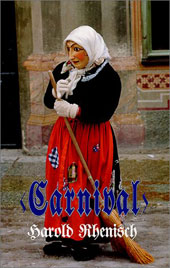The Porcupine's Quill
Celebrating forty years on the Main Street
of Erin Village, Wellington County
BOOKS IN PRINT
Carnival by Harold Rhenisch
Poet, bioregional essayist, and explorer of post-colonial landscapes in decay and transition, Harold Rhenisch combines his father’s character with his own, and in a series of luminous, closely-linked stories, takes the reader on an emotional journey through humour, joy, heartbreak, horror, spiritual catastrophe and redemption, to present a second look at history. This is war from a child’s eyes, up close and personal, from silly pranks, to playing war games in the forest and, finally, to miracles of healing as the fabric of the world collapses and must be rebuilt.
Hansel, his mother, and their 16-year-old Russian maid, tend an escaped French P.O.W. in their basement in a small town on the edge of the Black Forest during the Second World War. During the Occupation, this act simultaneously saves their lives and also brings them close to death, as they attempt to save the innkeeper’s daughter after a brutal rape by occupying Moroccan soldiers and the horrific punishment enacted upon them by the French command. This story is not fiction. It is the art of story-telling that creates for us Hansel’s fairytale village -- at once a magical world of mermaids, witches, carnival characters and eelfishers, and also a sulfur-choked, brutalized wartime town.
The Canadian farmer who was Hansel returns to this German town to relive the dreams, stories, and terrors he experienced fifty years before. In incandescent, emotionally-charged prose he seeks among the ruins of society to understand love and his place in the world as a man. This is a powerful and captivating evocation of innocence and storytelling from one of Canada’s master prose stylists.
Review text
‘...The book’s genesis was apparently long and arduous. In 1984 Rhenisch taped his father’s troubling stories of life in a small town in Southern Germany during World War II. Rhenisch put the stories together by 1987, but did not publish them for another 11 years, learning German, traveling to Germany and slowly realizing that his father’s original form was irretrievable. Instead, Rhenisch decided to ‘‘enter’’ his father to ‘‘help him understand the more difficult parts of his story,’’ even as his father brought out the hidden roots of Rhenisch’s own story.
‘The results are often nothing less than astounding. In a wartime town made claustrophobic by the transformation of men into uniformed ‘‘angels’’ and a house made claustrophobic by the split between husband and wife, young Hansel must find his way around as the darkness comes looking for him. He becomes familiar with all manner of mystery and degradation, as the police use the maid Maryushka sexually, the Moroccan soldiers rape and kill his girlfriend, and our Leader’s portrait begins to weep tears. Hansel’s father tells him that ‘‘the world is built out of force ... without force you cannot make anything,’’ and joins the Nazis in hope of a material success that never comes. His mother, a physician, but stigmatized by divorce, struggles to survive, and goes so far as to marry the abusive Blaumann to put bread on the table.
‘According to the book’s back cover, Rhenisch is one of Canada’s master prose stylists, and that’s not far off, even if you haven’t heard of him: ‘‘You do not see angels going around with a bucket of glue, a mop and a bunch of handbills, plastering them on the wall: ‘You Cannot Have a Bicycle; ‘God Is Not Making Any More Bicycles. God Has Guns to Make with the Steel.’ What happens here is what happens with God; what happens with God happens here. It is our war. We have melted all our bicycles down and dropped them on London. There are many children there who do not have a mom because of our bicycles falling from the sky. It rains bicycles. The sky was so choked up with bicycles that they start to rain, a hard, hard rain!’’ ’
—Canadian Literature
Rhenisch was raised in the German farm culture of the Okanagan, which sheltered both the innocent and the damned. Grandson of a communist from the ’20s and two German doctors from Freiburg, he grew up into a world of story-telling, shame, and pride. Within the experience of twenty-four books and six extended trips within East and West Germany, Rhenisch now lives in Campbell River on Northern Vancouver Island.
For more information please visit the Author’s website »
The Porcupine's Quill would like to acknowledge the support of the Ontario Arts Council and the Canada Council for the Arts for our publishing program. The financial support of the Government of Canada through the Canada Book Fund (CBF) is also gratefully acknowledged.





